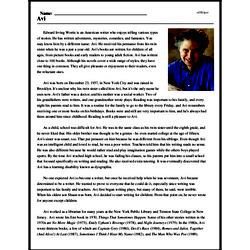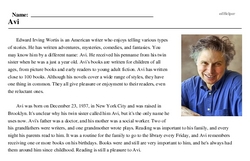Avi
Edward Irving Wortis is an American writer who enjoys telling various types of stories. He has written adventures, mysteries, comedies, and fantasies. You may know him by a different name: Avi. He received his penname from his twin sister when he was a just a year old. Avi's books are written for children of all ages, from picture books and early readers to young adult fiction. Avi has written close to 100 books. Although his novels cover a wide range of styles, they have one thing in common. They all give pleasure or enjoyment to their readers, even the reluctant ones.
Avi was born on December 23, 1937, in New York City and was raised in Brooklyn. It's unclear why his twin sister called him Avi, but it's the only name he uses now. Avi's father was a doctor, and his mother was a social worker. Two of his grandfathers were writers, and one grandmother wrote plays. Reading was important to his family, and every night his parents read to him. It was a routine for the family to go to the library every Friday, and Avi remembers receiving one or more books on his birthdays. Books were and still are very important to him, and he's always had them around him since childhood. Reading is still a pleasure to Avi.
As a child, school was difficult for Avi. He was in the same class as his twin sister until the eighth grade, and he never liked that. His older brother was thought to be a genius - he even started college at the age of fifteen. Avi's sister was smart, too. That put pressure on him because he was different from his siblings. Even though Avi was an intelligent child and loved to read, he was a poor writer. Teachers told him that his writing made no sense. He was also different because he would rather read and play imagination games while the others boys played sports. By the time Avi reached high school, he was failing his classes, so his parents put him into a small school that focused specifically on writing and reading. He also received extra tutoring. It was eventually discovered that Avi has a learning disability known as dysgraphia.




